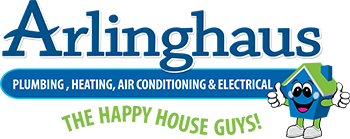Like most other appliances in your home, the way you use your HVAC equipment has an impact on its efficiency. The system is designed for maximum efficiency, allowing you to operate it effectively without a lot of specialized knowledge. However, that efficiency is only for optimum use. The unique aspects of your home and your operation of the system can decrease overall efficiency, especially if you do not pay close attention to how you are using your heating & air conditioning.
What is HVAC Efficiency?
If you’re getting ready to purchase a new piece of heating & air conditioning equipment—or just investigating the efficiency of your current machinery—you should know that each system has its own, unique efficiency rating. All appliances are not equal in efficiency, so knowing what these ratings mean can be very helpful.
AFUE
The efficiency of furnaces and boilers is specified by the annual fuel utilization efficiency (AFUE).
Furnaces rely on some kind of energy or fuel to run them, typically natural gas or heating oil. These furnaces burn fuel to create heat, and some of that fuel is lost as a byproduct of the burning process. The AFUE measures the percentage of fuel that the furnace is able to convert directly to heat. As such, a furnace with an AFUE of 95 converts 95 percent of the fuel into heat for the home.
SEER
The seasonal energy efficiency ratio (SEER) is based on a machine’s efficiency in cooling a home.
To come to a SEER rating, the appliance is put through a variety of tests, requiring it to cool a home to different temperatures, based on higher and lower outdoor temperatures. This helps to determine the appliance’s actual efficiency over a season, when you might expect cooler and hotter temperatures from month to month. Higher numbers indicate greater efficiency.
Common Causes of HVAC Inefficiency
All efficiency ratings listed on the machine are the highest level of efficiency you can expect from the unit from the day you purchase it. There are many other aspects of your HVAC system, or your home at-large, that might have an adverse effect on the efficiency of your heating & air conditioning units. Keeping them in check will promote HVAC efficiency, improve the lifespan of your equipment and even help decrease your energy costs.
1. Filtration
One of the least-expensive parts of your HVAC system is the cause of more problems than you could possibly imagine. Air filters are quite easy to clean and replace, if you know what size you need. All you have to do is check your filters once a month and plan to clean or replace them once a season. If this does not happen, the filter gets progressively blocked with dirt, dust and other debris. Like your clothes dryer’s lint trap, your air filters are what stand between your machine and necessary airflow. If air cannot pass through the filter, your furnace or air conditioner starts running more often or longer. You end up with higher utility bills and heating or cooling that doesn’t quite hit the mark despite the added cost.
2. Drafts and Air Leaks
Once the heated or cooled air leaves the appliance, it has to go to all the different rooms of your home. Otherwise, you would have to crowd around it like a fire or a fan. However, leaks in your ductwork mean that a lot of the air ends up on your ceiling or in your attic. This could translate into a loss of as much as 30 percent of your heated air, which makes your equipment run longer and use more energy. The exterior of your home is also a common source of leaks that send the treated air outside. Sealing duct and other air leaks throughout your home helps ensure that heated or cooled air reach its destination with less work.
3. Poor Airflow
You understand how important it is to keep a clear filter for airflow to pass through, but airflow can be blocked in other places as well. For example, your air conditioner requires a lot of airflow on all sides of the exterior unit. When bushes, trees or clutter block that airflow, the air conditioner has to work harder to pull air in. Trim greenery and create a clutter-free space around the unit that offers at least a foot of open airflow on all sides.
4. Overuse of the HVAC System
It does not take an HVAC expert to know that if you are constantly running your furnace or air conditioner full-blast, it will not work as well or last as long. These appliances are designed to promote efficiency, but they require you to use them effectively. This means using a programmable thermostat with settings that allow the machine time to transition from one desired temperature to another. If you regularly change the settings by several degrees, the equipment must expend a greater amount of energy to change the temperature more quickly. Decreasing your use of the system may be as simple as dressing appropriately for the weather or using windows effectively.
5. Infrequent Upkeep
Although your HVAC system is built so that you could “set it and forget it,” optimal use involves regular upkeep from a homeowner and from HVAC professionals. A system with little maintenance may work just fine for years—until it abruptly breaks down due to a problem that was never noticed, much less fixed. As a homeowner, you should plan to keep the equipment clean and clear regularly. Professional service once a year provides upkeep for the internal components that require specialized training. These simple tasks can dramatically improve the lifespan of the equipment.
The less efficient your HVAC equipment is, the more you have to pay for a comfortable home. These typical causes of HVAC inefficiency cost you in money and convenience. When you improve HVAC efficiency, your comfort goals are easier to achieve. Learn more about how an efficient system can increase home value.


